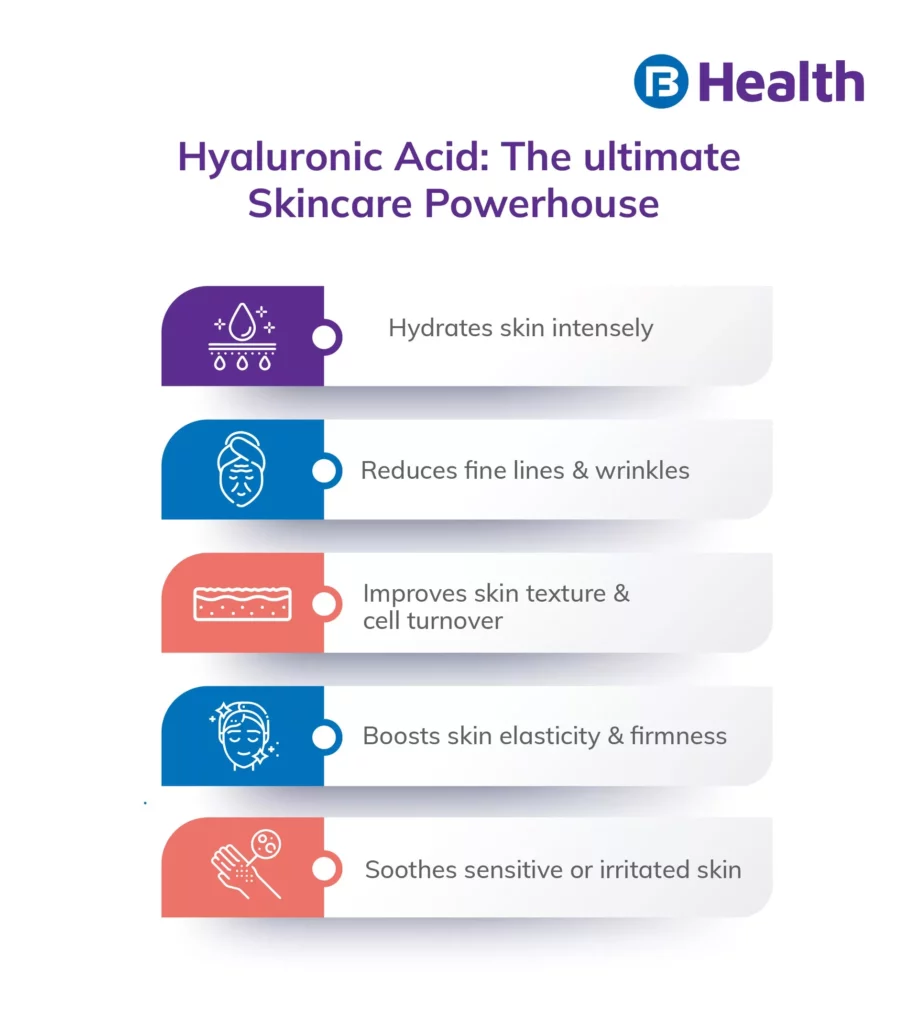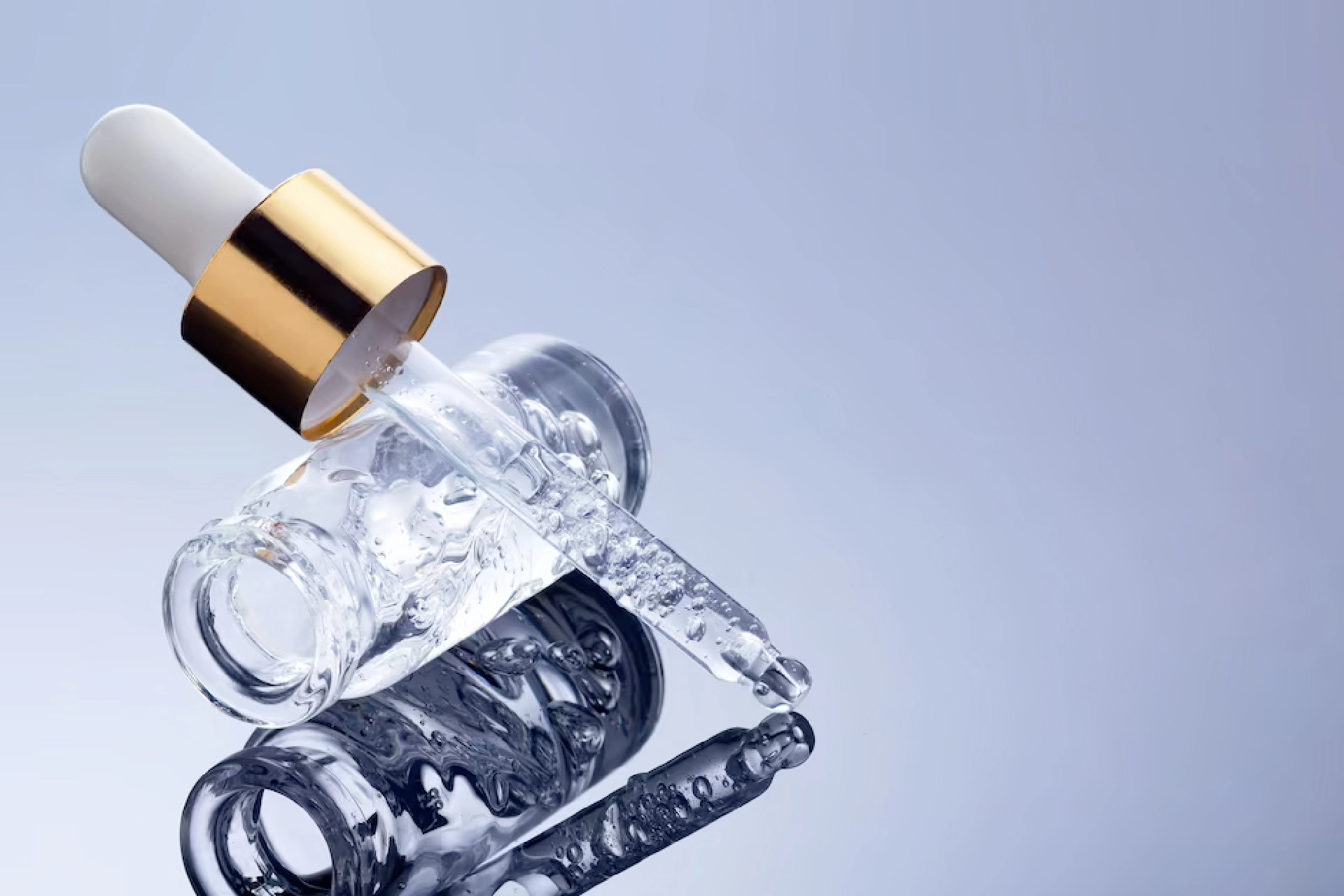General Health | min read
Benefits of Hyaluronic Acid: Know How to Use it Effectively
Medically reviewed by
Table of Content
Synopsis
This blog post explores the uses and benefits of hyaluronic acid, a natural substance found in the body that plays a vital role in skin and joint health. From reducing joint pain to promoting youthful-looking skin, we'll discuss the science behind this versatile molecule and tips to incorporate it into your routine.
Key Takeaways
- Hyaluronic acid naturally occurs in the body. It helps keep our skin and joints healthy
- Using hyaluronic acid topically or taking it as a supplement improves skin hydration and elasticity
- While hyaluronic acid is generally safe, it's important to be aware of potential side effects
As you might have heard, there are multiple benefits of hyaluronic acid. Hyaluronic acid (HA) has recently gained popularity as a skincare and joint health ingredient. This naturally occurring molecule is found in the body and has numerous benefits, from improving skin hydration to reducing joint pain. In this blog, we'll take a closer look at what hyaluronic acid is, its benefits, how to use it, and potential side effects.
Hyaluronic Acid: What is it?
It is a naturally occurring molecule found in the body. It's most abundant in the skin, eyes, and joints, where it helps to lubricate and cushion. In addition, HA is a type of glycosaminoglycan, a long chain of sugar molecules that helps to maintain the structural integrity of several connective tissues. Hence, there are multiple benefits of hyaluronic acid.
General Benefits of Hyaluronic Acid
Skin health
The benefits of hyaluronic acid are plenty. It is a popular ingredient in skincare products because it hydrates and plumps the skin. HA can hold up to 1,000 times its weight in water, making it an excellent moisturizer. It also helps to improve the elasticity and firmness of the skin, which ultimately results in a more youthful appearance.
Joint health
The benefits of hyaluronic acid even extend to improving joint health. Hyaluronic acid is also commonly used to treat joint pain, particularly in people with osteoarthritis. HA acts as a lubricant and shock absorber, reducing friction and protecting the joints from damage.
Eye health
Hyaluronic acid is present in the vitreous humor, the gel-like substance that fills the eyeball. It helps maintain the eye's shape and provides a cushioning effect, protecting the retina from damage. Hence, the benefits of hyaluronic acid also include improving eye health.
Additional Read: Stretch Marks Sign
Hyaluronic Acid Benefits for Skin
There are several benefits of hyaluronic acid for the skin, and they are as follows:
- Moisturizing: Hyaluronic acid is a natural humectant, which means it attracts and retains moisture. When applied topically, it can help hydrate the skin and improve its texture and appearance
- Anti-ageing: As we age, our skin's ability to produce hyaluronic acid decreases, leading to the appearance of fine lines and wrinkles. By applying hyaluronic acid topically, we can help plump up the skin and reduce the appearance of wrinkles
- Wound healing: Hyaluronic acid can help promote wound healing by reducing inflammation and aiding in tissue repair
Additional Read: Benefits of Kefir
Benefits of Hyaluronic Acid for Acne
Hyaluronic acid can also benefit those with acne-prone skin. Here's how:
- Hydration: Acne medications can often be drying to the skin, leading to irritation and further breakouts. Hyaluronic acid aids in hydrating the skin and reducing the likelihood of dryness and irritation
- Anti-inflammatory: Acne is often caused by inflammation in the skin. HA has anti-inflammatory properties that can help reduce redness and irritation
- Non-comedogenic: Hyaluronic acid is non-comedogenic, meaning it won't clog pores or contribute to further breakouts
Hyaluronic Acid for Oily Skin
There are several benefits of hyaluronic acid for oily skin.
If you have oily skin, you may be hesitant to add any additional moisture to your routine. However, hyaluronic acid can still benefit oily skin types in the following ways:
- Lightweight: Hyaluronic acid is a lightweight moisturizer that won't feel heavy or greasy on the skin
- Balancing: Despite being a moisturizer, hyaluronic acid can actually help balance oil production in the skin. When the skin is dehydrated, it can overproduce oil to compensate. By hydrating the skin with hyaluronic acid, you may be able to reduce excess oil production
- Non-comedogenic: As mentioned earlier, hyaluronic acid is non-comedogenic, meaning it won't clog pores or worsen breakouts, making it an excellent choice for persons with oily or acne-prone skin
Hyaluronic Acid Uses for Hair
There are several benefits of hyaluronic acid for hair as well! Hyaluronic acid is beneficial in improving the overall health and appearance of the hair by:
- Moisturizing the scalp: Hyaluronic acid can help to moisturize the scalp, reducing dryness and flakiness that can lead to dandruff
- Increasing hair elasticity: Hyaluronic acid can help to strengthen hair strands, making them more resistant to breakage and damage
- Improving hair texture: By increasing hair elasticity and hydration, hyaluronic acid can help to improve the texture and appearance of the hair, making it look smoother and shinier
- Stimulating hair growth: Hyaluronic acid can help to improve blood flow to the scalp, which can stimulate hair growth and improve hair thickness and density
- Protecting against damage: Hyaluronic acid can also provide a protective barrier around the hair shaft, helping to prevent damage from environmental stressors like UV rays and pollution
Hyaluronic Side Effects you Must Know
Although there are several benefits of hyaluronic acid, and it is generally safe and well-tolerated, some people may experience side effects. These can include redness, itching, swelling at the injection site (if used as a dermal filler), headaches, and nausea (if taken as a supplement). Therefore, talking to your healthcare provider before starting any new supplement or skincare regimen is always a good idea.
However, here are some hyaluronic side effects for you:
- Allergic reactions: Some people may experience a bad allergic reaction to hyaluronic acid, which could result in redness, itching, or swelling at the injection site or on the skin
- Pain or discomfort: If hyaluronic acid is injected into the joints, it may cause temporary pain or discomfort at the injection site
- Headaches: In rare cases, hyaluronic acid injections may cause headaches, particularly if injected into the neck or head
- Infection: As with any injection, there is a risk of infection at the injection site. It's important to ensure that the injection is performed in a sterile environment by a qualified healthcare provider
- Bleeding or bruising: Hyaluronic acid injections may cause bleeding or bruising at the injection site, particularly if you are taking blood thinners or have a bleeding disorder
- Numbness or tingling: In rare cases, hyaluronic acid injections may cause numbness or tingling in the affected area, particularly if injected into the hands or feet
Beneficial Uses of Hyaluronic Acid
There are benefits of hyaluronic acid and various other uses in various industries, including medicine, cosmetics, and skincare. Here are some of the most notable uses:
- Joint health: Hyaluronic acid is a key component of synovial fluid, which aids in lubricating and cushioning joints. This makes it an effective treatment for joint disorders such as osteoarthritis and rheumatoid arthritis
- Wound healing: Hyaluronic acid can promote wound healing by regulating inflammation and increasing the production of collagen, a protein that plays a critical role in tissue repair
- Eye health: Hyaluronic acid is found in high concentrations in the vitreous humour, the gel-like substance that fills the eyeball. It can help to maintain the shape of the eye and protect against injury
- Skincare: Hyaluronic acid is commonly used in skincare products due to its ability to hydrate the skin and improve its texture and elasticity deeply. It can also help to reduce fine lines and wrinkles
- Hair health: As mentioned earlier, hyaluronic acid can provide numerous benefits for hair health, including moisturizing the scalp, increasing hair elasticity, improving texture and appearance, stimulating hair growth, and protecting against damage
- Cosmetics: Hyaluronic acid is also used in cosmetics, such as lip fillers and dermal fillers, to add volume and reduce the appearance of wrinkles and fine lines
Overall, hyaluronic acid has a wide range of beneficial uses across various industries and applications, making it a versatile and valuable ingredient.

There are various benefits of hyaluronic for both skin and hair health. However, it's important to consult a healthcare professional or dermatologist before using it. Online appointments with licensed professionals are easily available through telemedicine platforms. Get a virtual appointment and personalized recommendations for a healthier skincare and haircare routine.
Frequently Asked Questions
References
Disclaimer
Please note that this article is solely meant for informational purposes and Bajaj Finserv Health Limited (“BFHL”) does not shoulder any responsibility of the views/advice/information expressed/given by the writer/reviewer/originator. This article should not be considered as a substitute for any medical advice, diagnosis or treatment. Always consult with your trusted physician/qualified healthcare professional to evaluate your medical condition. The above article has been reviewed by a qualified doctor and BFHL is not responsible for any damages for any information or services provided by any third party.



